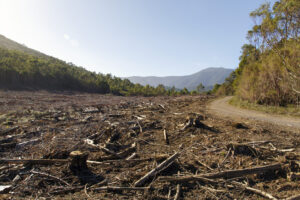The logging industry should be bound by Australia’s environment protection laws just like everyone else

This week, a private member’s bill to end native forest logging was up for debate. It sought to repeal legislation that exempts logging in much of Australia’s public forest estate from our national environment laws.
The bill was defeated by the two major parties.
Many Australians may not be aware that the logging industry gets to clearfell our publicly owned native forests without even having to comply with Australia’s national environment legislation, the Environment Protection and Biodiversity Conservation Act (EPBC Act).
This feature of our law was never fair, never made sense, and in the middle of an extinction and climate crisis, it’s akin to pulling up our threatened environment by the roots.
This is why logging continues without restriction in koala habitat in NSW and in swift parrot habitat in Tasmania.
When it comes to logging our native forests, it’s the logging companies rather than the koalas who are being protected.
For a quarter of a century, our forests have been regulated by two key pieces of federal legislation: the EPBC Act and the Regional Forest Agreements Act 2002 (RFA Act). But instead of doubling the protection of our forests, these laws fragmented responsibility, delivering decades of industry mismanagement, biodiversity loss, species extinction and community division.
Due to an ill-conceived and outdated legal loophole, logging in our native forests does not have to comply with the EPBC Act.
Section 38 of the EPBC Act exempts from approval requirements any logging undertaken in accordance with a Regional Forest Agreement.
Many of the forests still being logged today are critical habitat for threatened species. And these forests would need federal approval from Environment Minister Tanya Plibersek, if only they were not covered by a Regional Forest Agreement.
In other words, without the legal exemption, there would be a strong case for the Minister to stop the logging.
The native forest logging industry no longer exists in most Australian states. Where it does, it’s propped up by government subsidies.
Yet, despite the collapse of the industry, Australia was the only developed country to make it onto the 2021 list of global deforestation hotspots. In 2024, ecologically crucial forests continue to fall faster than the industry itself.
In 2022 the Australian Government released its Threatened Species Strategy Action Plan that listed swift parrots as a priority species. As its name suggests, the swift parrot is the fastest parrot in the world. It is only found in Australia, spending the winter in Victoria and New South Wales before nesting in Tasmania each summer.
The Government’s Action Plan found that native forest logging was “a significant threat” to the parrot’s survival.
In response to the report, Minister Plibersek announced that “…for the first time in Australian history Regional Forest Agreements will have to comply with new environment laws.” But the report does not require state logging agencies to change their plans and swift parrot habitat continues to be logged.
The Government is now consulting on the next stage of federal nature laws.
In the lead up to the 2022 federal election, the Albanese government promised an urgent overhaul of our environment laws. It has not yet happened, won’t happen this year, and probably won’t even happen in this term of government.
If she chose to, Environment Minister Tanya Plibersek could improve the way our forests are managed tomorrow, simply by removing the exemption for logging covered by Regional Forest Agreements.
Repealing Section 38 of the EPBC Act or passing a bill of the type that was debated and defeated this week would level the environment protection playing field and strengthen Australia’s environmental laws.
The logging industry should be bound by Australia’s environment protection laws just like everyone else.
Between the Lines Newsletter
The biggest stories and the best analysis from the team at the Australia Institute, delivered to your inbox every fortnight.
You might also like
Five priorities for the next parliament if we want a liveable Australia
Climate and nature crises won’t pause while politics plays out.
Voters overwhelmingly support stronger whistleblower protections – new poll
New polling research by The Australia Institute reveals that 86% of Australians want stronger legal protections for whistleblowers.
Government is ‘nature positive’ in the same way asbestos is lung positive
It’s like an episode of Utopia or Yes Minister – just a week out from the government’s Global Nature Positive Summit, Environment Minister Tanya Plibersek approved three whopping coal mine extensions in NSW.



